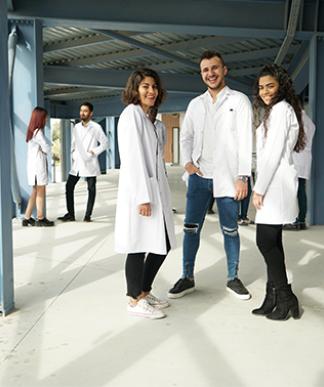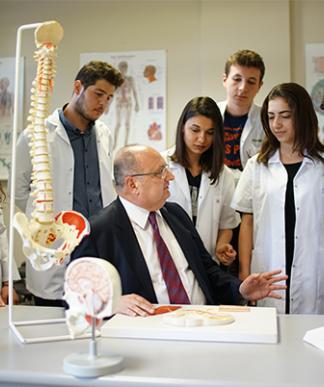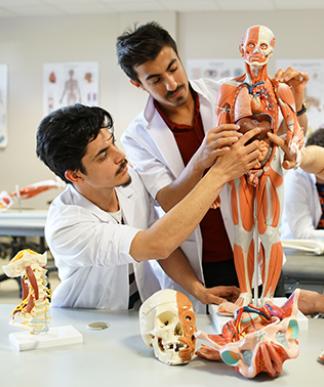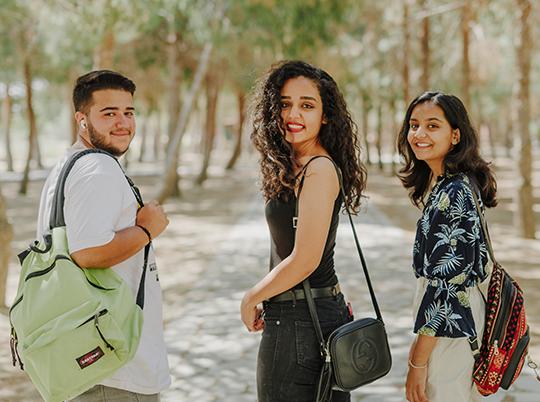


About the Department
Physiotherapy and Rehabilitation Department undergraduate program has been providing formal education since the 2012-2013 academic year. The students are taught theoretical and practical basic information in the field of physiotherapy and rehabilitation, and current education and training practices. Today, physiotherapists provide services with increasing numbers of approaches in increasing the quality of life related to independent movement and health in all situations where movement and function are threatened for various reasons. The present and future needs of societies that have become increasingly inactive due to the developing technology in the world and in our country make the development of the physiotherapist profession inevitable. Within the scope of the department, it is aimed to improve the quality of life of the individual with multidimensional physiotherapy and rehabilitation approaches in order to improve the functions of the musculoskeletal system and other system disorders, and to plan accurate and effective exercise programs.
Education Opportunities
Duration of physiotherapy and rehabilitation training is 4 years, and those who wish can pursue a master's or doctorate. During their education, physiotherapists study basic medical sciences such as anatomy, physiology, pathology, neuroanatomy, as well as profession-specific theoretical and practical skills such as electrophysical agents, kinesiology, manipulative therapy, basic measurement and evaluation, neurophysiological approaches, orthotics-prosthesis rehabilitation, pediatric rehabilitation, sportsman health and rehabilitation. There are therapeutic movements and electrotherapy laboratories within the department and anatomy laboratory within the faculty. There are summer internships in the 2nd and 3rd classes of the education, and practical applications within the scope of clinical work in the 4th class. Lessons are given in a way that will develop students' imagination and analytical thinking skills, with a staff of experts and professionally experienced higher education staff. Students who wish can do double major or minor with various departments while continuing their physiotherapy and rehabilitation education.

Accreditations and Memberships
Cyprus International University (CIU) Faculty of Health Sciences, Physiotherapy and Rehabilitation Undergraduate Program was awarded a 2-year accreditation between 19 March 2021 – 30 September 2023, as a result of the evaluation made by the SABAK. Within the scope of the accreditation process, within the framework of the criteria determined by SABAK, improvements and innovations were made in the educational objectives of the program, curriculum syllabus and course contents in accordance with the views and demands of internal and external stakeholders. Within the framework of accreditation studies, great steps are taken to increase the various activities and seminars currently held in order to contribute to the academic development of the academic staff, to increase the student satisfaction, to increase the employment opportunities of the graduates and to facilitate the exchange of students and lecturers between universities.
On August 2, 2024, Cyprus International University became a member of the European Network of Physiotherapy in Higher Education (ENPHE). This membership represents a significant step in strengthening our academic collaborations in the field of physiotherapy and enhancing the quality of education across Europe.
Career Areas
Physiotherapists can work in various units of public and private hospitals that provide preventive, treatment and rehabilitation services (neurology, orthopedics and traumatology, rheumatology, sports injuries, cardio-pulmonary, chest diseases, intensive care, etc.), sports-health centers, various sports clubs, retirement homes and spa-thermal facilities in our country as well as abroad. With the new regulations, physiotherapists can now also work in the Guidance and Research Centers. However, since the need for academics is high, he can work as a research assistant, lecturer or manager in the Physiotherapy and Rehabilitation Departments of universities. He can work as an academician by obtaining a science expertise and doctorate degree in the specialized branches of Physiotherapy and Rehabilitation, and can contribute to the development of evidence-based practices by reaching the rank of associate professor and professor in the field of Physiotherapy and Rehabilitation.
Contact
Faculty of Health Sciences
Çevik Uraz Center, CU206
Tel: +90 392 671 1111 Extension: 2251
Faculty E-mail: secretary-fhs@ciu.edu.tr
Head of Department: Asst. Prof. Dr. Hülya ÖZBEŞER
Head of Department E-mail: hozbeser@ciu.edu.tr
Compulsory Courses
First Semester
BASIC ANATOMY
Course code
ANTM113Credit
5Theoretical
3Practical
4Ects
6READING AND WRITING SKILLS-I
Course code
ENGL141Credit
3Theoretical
2Practical
2Ects
4INTRODUCTION TO COMPUTERS
Course code
ITEC110Credit
3Theoretical
3Practical
0Ects
4PHYSIOLOGY-I
Course code
PHYO105Credit
3Theoretical
3Practical
0Ects
5PHYSICS
Course code
PHYS107Credit
2Theoretical
2Practical
0Ects
3INTRODUCTION TO PHYSIOTHERAPY
Course code
PTRE101Credit
2Theoretical
2Practical
0Ects
3THERMAL-LIGHT-HDYROTHERAPY
Course code
PTRE105Credit
2Theoretical
2Practical
1Ects
3TURKISH LANGUAGE
Course code
TREG100Credit
0Theoretical
2Practical
0Ects
2TURKISH
Course code
TURK100Credit
0Theoretical
2Practical
0Ects
2Second Semester
ADVANCED ANATOMY
Course code
ANTM114Credit
5Theoretical
3Practical
4Ects
6READING AND WRITING SKILLS-II
Course code
ENGL142Credit
3Theoretical
2Practical
2Ects
4FREE ELECTIVE
Course code
FREEXX1Credit
2Theoretical
2Practical
0Ects
5OCCUPATIONAL ETHICS IN HEALTH
Course code
HELS250Credit
2Theoretical
2Practical
0Ects
2HISTORY OF CIVILIZATION
Course code
HIST100Credit
0Theoretical
2Practical
0Ects
2PHYSIOLOGY-II
Course code
PHYO106Credit
3Theoretical
3Practical
0Ects
5INTRODUCTION TO PSYCHOLOGY
Course code
PSYC103Credit
3Theoretical
3Practical
0Ects
4NORMAL MOTOR DEVELOPMENT
Course code
PTRE110Credit
2Theoretical
2Practical
0Ects
2MODERN TURKISH HISTORY
Course code
TARH100Credit
0Theoretical
2Practical
0Ects
2Third Semester
KINESIOLOGY-I
Course code
PTRE201Credit
2Theoretical
2Practical
1Ects
4MANIPULATIVE THERAPY-I
Course code
PTRE203Credit
3Theoretical
2Practical
2Ects
4ELECTROTHERAPY-I
Course code
PTRE205Credit
3Theoretical
2Practical
2Ects
5PATOLOGY
Course code
PTRE207Credit
2Theoretical
2Practical
0Ects
2BASIC MEASUREMENT AND EVALUATION IN PHYSIOTHERAPY
Course code
PTRE211Credit
3Theoretical
2Practical
2Ects
5NEUROANATOMY
Course code
PTRE217Credit
2Theoretical
2Practical
0Ects
3UNIVERSITY ELECTIVE
Course code
UNIEXX1Credit
3Theoretical
3Practical
0Ects
4UNIVERSITY ELECTIVE
Course code
UNIEXX2Credit
3Theoretical
3Practical
0Ects
4Fourth Semester
FREE ELECTIVE
Course code
FREEXX2Credit
2Theoretical
2Practical
0Ects
5KINESIOLOGY-II
Course code
PTRE202Credit
2Theoretical
2Practical
1Ects
4MANIPULATIVE THERAPY-II
Course code
PTRE204Credit
3Theoretical
2Practical
2Ects
4ELECTROTHERAPY-II
Course code
PTRE206Credit
3Theoretical
2Practical
2Ects
4PRINCIPLES OF THERAPEUTIC EXERCISES
Course code
PTRE208Credit
3Theoretical
2Practical
2Ects
5EXERCISE PHYSIOLOGY
Course code
PTRE212Credit
2Theoretical
2Practical
1Ects
3UNIVERSITY ELECTIVE
Course code
UNIEXX3Credit
3Theoretical
3Practical
0Ects
4Fifth Semester
SUMMER TRAINING-I
Course code
PTRE200Credit
0Theoretical
0Practical
0Ects
5NEUROPHYSIOLOGICAL METHODS-I
Course code
PTRE301Credit
3Theoretical
2Practical
2Ects
4PULMONARY REHABILITATION
Course code
PTRE309Credit
3Theoretical
2Practical
2Ects
3PHYSIOTHERAPY AND REHABILITATION IN SPORTS
Course code
PTRE311Credit
2Theoretical
2Practical
1Ects
2NEUROLOGICAL REHABILITATION
Course code
PTRE315Credit
3Theoretical
2Practical
2Ects
4PEDIATRIC REHABILITATION
Course code
PTRE317Credit
3Theoretical
2Practical
2Ects
3PROSTHETICS REHABILITATION
Course code
PTRE335Credit
2Theoretical
2Practical
1Ects
2AREA ELECTIVE
Course code
PTREXX1Credit
2Theoretical
2Practical
0Ects
5BIOSTATISTICS
Course code
STAT310Credit
2Theoretical
2Practical
0Ects
3Sixth Semester
RESEARCH METHODS IN HEALTH SCIENCES
Course code
HELS300Credit
2Theoretical
2Practical
0Ects
3NEUROPHYSIOLOGICAL METHODS-II
Course code
PTRE302Credit
3Theoretical
2Practical
2Ects
4CARDIAC REHABILITATION
Course code
PTRE310Credit
3Theoretical
2Practical
2Ects
4REHABILITATION IN ORTHOPEADIC AND RHEUMATOLOGIC DISEASES
Course code
PTRE316Credit
3Theoretical
2Practical
2Ects
5ORTHOTIC REHABILITATION
Course code
PTRE336Credit
2Theoretical
2Practical
1Ects
3AREA ELECTIVE
Course code
PTREXX2Credit
2Theoretical
2Practical
0Ects
5AREA ELECTIVE
Course code
PTREXX3Credit
2Theoretical
2Practical
0Ects
5Seventh Semester
FREE ELECTIVE
Course code
FREEXX3Credit
2Theoretical
2Practical
0Ects
5SUMMER TRAINING-II
Course code
PTRE300Credit
0Theoretical
0Practical
0Ects
5CLINICAL PRACTICE-I
Course code
PTRE401Credit
10Theoretical
0Practical
20Ects
12CLINICAL DECISION MAKING IN PHYSIOTHERAPY
Course code
PTRE415Credit
2Theoretical
2Practical
0Ects
3AREA ELECTIVE
Course code
PTREXX4Credit
2Theoretical
2Practical
0Ects
5Eighth Semester
FREE ELECTIVE
Course code
FREEXX4Credit
2Theoretical
2Practical
0Ects
5CLINICAL PRACTICE-II
Course code
PTRE402Credit
10Theoretical
0Practical
20Ects
12GRADUATION PROJECT
Course code
PTRE404Credit
2Theoretical
2Practical
0Ects
3AREA ELECTIVE
Course code
PTREXX5Credit
2Theoretical
2Practical
0Ects
5AREA ELECTIVE
Course code
PTREXX6Credit
2Theoretical
2Practical
0Ects
5Elective Courses
HAND REHABILITATION
Course code
PTRE420Credit
2Theoretical
2Practical
0Ects
5PHYSICAL FITNESS
Course code
PTRE215Credit
2Theoretical
2Practical
0Ects
5PILATES IN PHYSIOTHERAPY
Course code
PTRE313Credit
2Theoretical
1Practical
0Ects
5YOGA IN PHYSIOTHERAPY
Course code
PTRE325Credit
2Theoretical
2Practical
0Ects
5GENDER EQUALITY
Course code
SOWO327Credit
3Theoretical
3Practical
0Ects
5AQUATIC THERAPY
Course code
PTRE216Credit
2Theoretical
2Practical
0Ects
5A COMPREHENSIVE HISTORY OF HEALTH SCIENCES
Course code
HELS350Credit
3Theoretical
3Practical
0Ects
4PHYSIOTHERAPY AND REHABILITATION IN INTERNAL DISEASES
Course code
PTRE320Credit
2Theoretical
2Practical
0Ects
5GERIATRIC PHYSIOTHERAPY AND REHABILITATION
Course code
PTRE321Credit
2Theoretical
2Practical
0Ects
5INTENSIVE CARE PHYSIOTHERAPY AND REHABILITATION
Course code
PTRE318Credit
2Theoretical
2Practical
0Ects
5TR Applicants
TR Students who are successful in the exams conducted by the Higher Education Council Student Selection and Placement Center (ÖSYM) and are entitled to enroll in our university in line with their preferences can complete the registration process with the necessary documents for registration from our Registration and Liaison Offices throughout Turkey or from the Marketing Directorate on campus.
Click for detailed admission requirements information.
TRNC Applicants
TRNC citizens and TR citizen candidate students who have completed their entire high school education in TRNC. They are placed in undergraduate programs in line with their success in the CIU Student Placement and Scholarship Ranking Exam and the programs they prefer.
Students who are successful in the exam can register from the TRNC Marketing Office.
Applicants can directly apply online to our undergraduate programs using the application portal. Please fill in your details correctly and upload all the required documents listed on the last page of the application form.
Required documents;
- Completed application form,
- Higher/Secondary Certificate or equivalents (e.g. O/A’Level, WAEC/NECO),
- Evidence of English Language competence: TOEFL (65 IBT) or IELTS (5.5). Students without these documents will take the CIU English proficiency exam on campus following arrival,
- Scanned copy of international passport/birth certificate,
- Fully completed and signed CIU Rules and Regulations document (which can be downloaded during the online application).
Cyprus International University provides academic scholarships for its students as an incentive for success, with most students benefiting from 50%, 75% or 100% scholarships or discounted tuition fees. Click for more information.
Tuition Fees are determined at the beginning of each academic year. Candidate students who are entitled to enroll in CIU can learn their fees in line with the Tuition Fee Calculation system.
The Department of Physiotherapy and Rehabilitation aims to educate qualified physiotherapists and scientists who are respectful to human rights, knowledgeable, contemporary, have ethical values, are constructive, creative, respectful to human rights, adopted lifelong learning with teaching and communication skills, conduct multidisciplinary studies, provide professional and scientific physiotherapy and rehabilitation services. The department also aims to provide advanced science and technology for the benefit of society, Turkey and TRNC following universal and cultural values as well as meeting scientific and professional needs.
Knowledge
PO1: Has up-to-date theoretical and applied knowledge about Physiotherapy and Rehabilitation.
PO2: Identifies and defines problems using up-to-date knowledge in physiotherapy and rehabilitation, and plans treatment as per evaluation results.
Skills
PO3: Identifies and defines problems using up-to-date knowledge in physiotherapy and rehabilitation, and plans treatment as per evaluation results.
PO4: Implements and monitors the development of physiotherapy and rehabilitation processes within the frame of professional ethical principles, and changes or terminates processes when necessary.
PO5: Executes the necessary protocols for physiotherapy and rehabilitation practices by using the relevant technology, training and treatment equipment.
Competence
Ability to Work Independently and Take Responsibility
PO6: PO5 Takes responsibility, individually and as a team member, to solve complex unforeseen problems encountered in practices related to the field of Physiotherapy and Rehabilitation.
PO7: Can independently carry out projects and research related to Physiotherapy and Rehabilitation, and transfers results to the field application.
PO8: Contributes to the protection of public health in line with social needs and to the creation of necessary rehabilitation and health policies in parallel with the needs of society.
Learning Competence
PO9: Embraces personal development, information literacy and lifelong learning; uses information resources effectively.
Communication and Social Competence
PO10: Commands a foreign language in order to follow the developments in the field of physiotherapy and rehabilitation, as well as communicate in Turkish orally and in writing.
Domain-specific Competence
PO11: Organizes physiotherapy and rehabilitation services, and generates solutions against problems in line with knowledge and evidence.
PO12: Contributes quality management processes, in-field and extra-field education and professional promotion programs, and represents its profession at national and international levels.
PEG1: Having sufficient knowledge, skills and application equipment in the field of physiotherapy and rehabilitation,
PEG2: Having the ability to apply physiotherapy measurement, evaluation and treatment approaches suitable for the patient,
PEG3: Having investigative and questioning clinical problems, competent in clinical decision-making,
PEG4: Having a lifelong learning purpose and evidence-based practice skills related to their profession,
PEG5: Having the competence to work as a physiotherapist in any institution after graduation,
PEG6: To train graduates who can do academic work in the field of physiotherapy and rehabilitation and work internationally.
- Letter Grade Appeal Flowchart
- Student's Letter Grade Objection Process Guideline
- Deregistration Workflow Guide
- Student Double Major Registration Acceptance Guidelines
- Make-Up Exam Procedure Guide
- Summer Term Registration Workflow Guide
- Registration Deletion Procedures Flowchart
- Internal-External Stakeholders Work Flowchart
- Internship Flowchart and Instruction
- Clinical Practice Workbook
2024-2025 Academic Year Department Boards and Committees
| DEPARTMENT OF PHYSIOTHERAPY AND REHABILITATION | |
| DEPARTMENT BOARD I | |
| Head of the Department Board: | Asst. Prof. Hülya ÖZBEŞER PT. PhD |
| Department Board Member: | Prof. Salih ANGIN PT. PhD |
| Department Board Member: | PhD. Mernoush RADMEHR |
| Department Board Member: | PT, PhD. Mehmet MİÇOOĞULLARI |
| Department Board Member: | Sr. Instr. Havva GÖZGEN |
| Department Board Member: | Sr. Instr. Ayşe VOLKAN |
| Department Student Representative: | Berfin ÇOBAN |
| DEPARTMENT OF PHYSIOTHERAPY AND REHABILITATION | |
| DEPARTMENT BOARD II | |
| Head of the Department Board: | Asst. Prof. Dr. Hülya ÖZBEŞER |
| Department Board Member: | Prof. Dr. Salih ANGIN |
| Department Board Member: | Asst. Prof. Dr. Mernoush RADMEHR |
| Department Board Member: | Dr. Fzt. Mehmet MİÇOOĞULLARI |
| Department Board Member: | Sr. Instr. Havva GÖZGEN |
| Department Board Member: | Sr. Instr. Ayşe VOLKAN |
| Department Student Representative: | Berfin ÇOBAN |
| DEPARTMENT OF PHYSIOTHERAPY AND REHABILITATION | |
| INTERNSHIP COMMITTEE | |
| Chairman of the Internship Committee: | PT, PhD. Mehmet MİÇOOĞULLARI |
| Internship Commission Member: | Prof. Salih ANGIN PT. PhD |
| Internship Coordinator (TR): | Asst. Prof. Hülya ÖZBEŞER PT. PhD |
| Internship Coordinator (TRNC): | Sr. Instr. Havva GÖZGEN |
| Internship Commission Member: | Sr. Instr. Batuhan DERİCİOĞLU |
| Department Student Representative: | Berfin ÇOBAN |
| DEPARTMENT OF PHYSIOTHERAPY AND REHABILITATION | |
| EXEMPTION COMMITTEE | |
| Chairman of the Exemption Commission: | Asst. Prof. Hülya ÖZBEŞER PT. PhD |
| Exemption Commissioner: | PT, PhD. Mehmet MİÇOOĞULLARI |
| Exemption Commissioner: | Sr. Instr. Ayşe VOLKAN |
| Department Student Representative: | Berfin ÇOBAN |
| DEPARTMENT OF PHYSIOTHERAPY AND REHABILITATION | |
| ACCREDITATION COORDINATION COMMITTEE | |
| Accreditation Coordination Committee Chairman: |
Prof. Dr. Salih ANGIN PT. PhD |
| Accreditation Coordination Committee Member: | Asst. Prof. Hülya ÖZBEŞER PT. PhD |
| Accreditation Coordination Committee Member: | Asst. Prof. Dr. Mernoush RADMEHR |
| Accreditation Coordination Committee Member: | PT, PhD. Mehmet MİÇOOĞULLARI |
| Accreditation Coordination Committee Member: | Sr. Instr. Ayşe VOLKAN |
| Department Student Representative: | Berfin ÇOBAN |